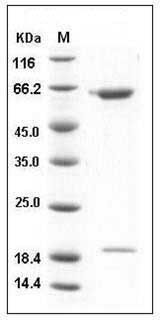-
Product Name
Rhesus PCSK9 (His Tag) recombinant protein
- Documents
-
Description
Crucial player in the regulation of plasma cholesterol homeostasis. Binds to low-density lipid receptor family members: low density lipoprotein receptor (LDLR), very low density lipoprotein receptor (VLDLR), apolipoprotein E receptor (LRP1/APOER) and apolipoprotein receptor 2 (LRP8/APOER2), and promotes their degradation in intracellular acidic compartments. Acts via a non-proteolytic mechanism to enhance the degradation of the hepatic LDLR through a clathrin LDLRAP1/ARH-mediated pathway. May prevent the recycling of LDLR from endosomes to the cell surface or direct it to lysosomes for degradation. Can induce ubiquitination of LDLR leading to its subsequent degradation. Inhibits intracellular degradation of APOB via the autophagosome/lysosome pathway in a LDLR-independent manner. Involved in the disposal of non-acetylated intermediates of BACE1 in the early secretory pathway. Inhibits epithelial Na(+) channel (ENaC)-mediated Na(+) absorption by reducing ENaC surface expression primarily by increasing its proteasomal degradation. Regulates neuronal apoptosis via modulation of LRP8/APOER2 levels and related anti-apoptotic signaling pathways (By similarity).
-
Protein name
Proprotein convertase subtilisin/kexin type 9
-
Protein short names
FH3; NARC-1; MGC47409; PC9; PCSK9; RP23-159J7.1; NARC1; HCHOLA3; LDLCQ1; PSEC0052; MACACA MULATTA; AI415265; AI747682
-
Uniprot ID
A8T666
-
Gene Name
PCSK9
-
Source/Expression Host
Human Cells
-
Expression Plasmid/cDNA
A DNA sequence encoding the Rhesus PCSK9 (NP_001106130.1) (Met 1-Gln 692) precursor was expressed, fused with a polyhistidine tag at the C-terminus.
-
Protein Species
Rhesus
-
Molecular weight
The recombinant Rhesus PCSK9 consists of 673 amino acids and predicts a molecular mass of 72.7 kDa. As a result of glycosylation and proteolytic digestion, it migrates as doublet with apparent molecular mass of 20 kDa and 62 kDa corresponding to the pro domain and mature form respectively in SDS-PAGE under reducing conditions.
-
Purity
> 95 % as determined by SDS-PAGE
-
Activity
1. Measured by its ability to bind biotinylated human LDLR in a functional ELISA.
2. Measured by its ability to bind biotinylated mouse LDLR in a functional ELISA. -
Validations

Rhesus PCSK9 / NARC1 Protein (His Tag) SDS-PAGE
Related Products / Services
Please note: All products are "FOR RESEARCH USE ONLY AND ARE NOT INTENDED FOR DIAGNOSTIC OR THERAPEUTIC USE"
